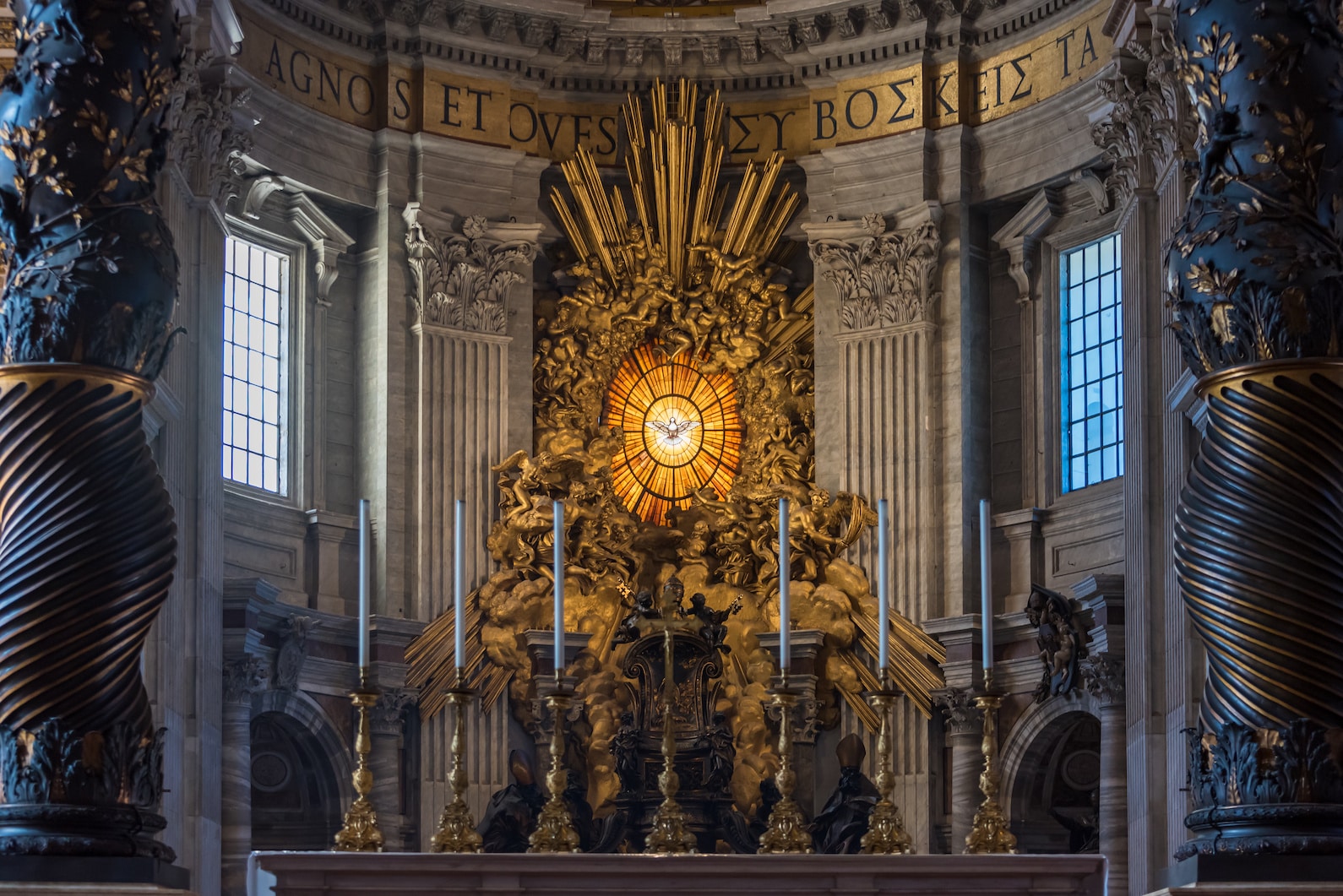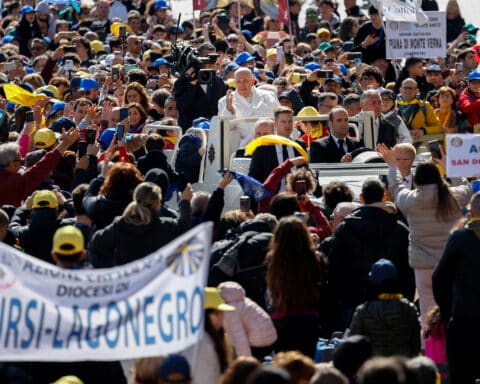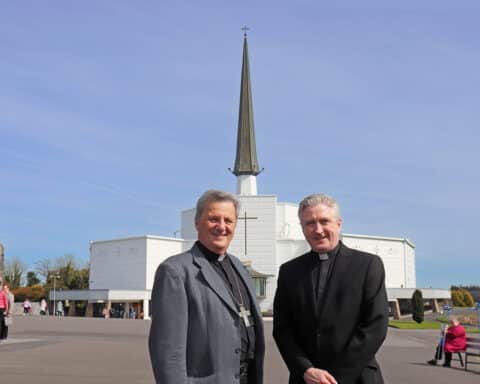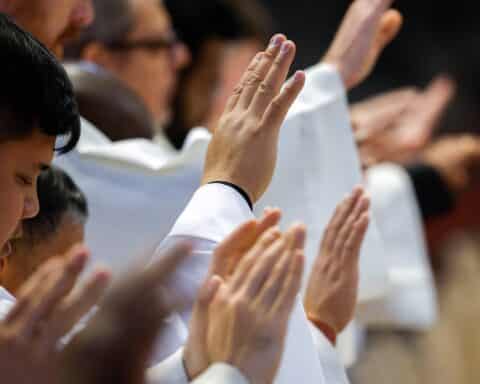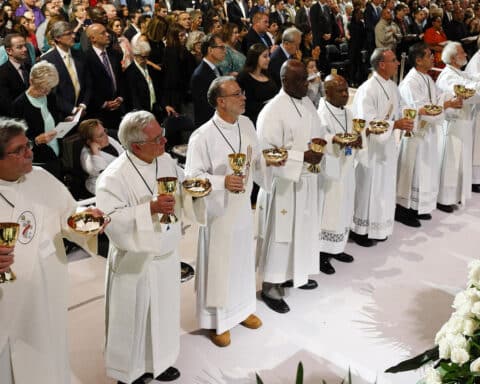What does confidence in the Holy Spirit mean for the Church today?
As pilgrims walk down the main aisle of St. Peter’s Basilica, the first thing that catches their eye is the main altar, crowned by its stunning baldachin. Situated under the tallest dome in the world, the altar is nothing short of astonishing.
But curious pilgrims will continue past the main altar and discover just behind it the Altar of the Chair. There, they will see a massive bronze throne that appears to float in midair. The throne is a visible manifestation of the Chair of Peter, a sign of Our Lord’s commissioning of Peter at Caesarea Philippi to lead the Church.
But the throne does not float on its own. It is actually held up by Sts. Ambrose, Augustine, John Chrysostom and Athanasius. (The saints are the great minds of both East and West.) Above the throne, pilgrims can’t miss the Holy Spirit’s glory shining through a spectacular stained glass window.
What is the artist telling us? Taken as a whole, the scene is nothing short of a brilliant depiction of the Holy Spirit, guarding and governing the life of the Church since the Church was inaugurated by Christ.
A guide from all time
The Holy Spirit, Catholics believe, leads, guides and comforts the Church. The Holy Spirit is called the “Paraclete” or the Advocate. The Catechism of the Catholic Church teaches: “The mission of Christ and the Holy Spirit is brought to completion in the Church, which is the Body of Christ and the Temple of the Holy Spirit. This joint mission henceforth brings Christ’s faithful to share in his communion with the Father in the Holy Spirit” (No. 737). The coming of the Holy Spirit was not temporary. The Church lives now in the perduring age of the Holy Spirit. He will not abandon us.
We must profess our confidence in the faithful, continued action of the Holy Spirit. As the Synod of Bishops on Synodality meets to discuss complex issues, the guidance of the Holy Spirit is essential. With confidence in the Holy Spirit’s wisdom, participants will navigate challenging discussions with humility and openness, seeking solutions that align with God’s will.
Because the Holy Spirit does not guide the Church only in the present moment but has guided it constantly throughout the centuries, the discussions of the bishops and other participants in the synod will not be a free-for-all. The Holy Spirit inspired the authors of Sacred Scripture. The Holy Spirit has guided the Church’s Tradition, especially as witnessed and taught by the Church Fathers. The Holy Spirit has led the Magisterium, inspiring popes to protect the deposit of faith and to continue to lead countless souls to the saving Truth of the Gospel.
Moreover, the Holy Spirit’s work is not confined to merely the Petrine Office or the Magisterium. The Holy Spirit inspires the members of the Church, the parts of the Body of Christ. St. Paul writes: “There are different kinds of spiritual gifts but the same Spirit; there are different forms of service but the same Lord; there are different workings but the same God who produces all of them in everyone. To each individual the manifestation of the Spirit is given for some benefit” (1 Cor 12:4-7).
Trust in the Holy Spirit
The Holy Spirit’s gifts are not given for self-aggrandizement but for the collective benefit of the Church. We must utilize those gifts and not allow them to rest idle! The same Holy Spirit will direct those gifts to their full flourishing as disciples. But we must be docile to the Holy Spirit, listening for the ways the Holy Spirit is guiding us now and responding in continuity with the perennial teaching of the Church.
The Synod on Synodality is not an isolated event but a continuation of the Church’s work for the salvation of the world. We can trust that the Holy Spirit will ensure that the synodal process bears fruit beyond the meetings themselves. Vatican II teaches, “By the power of the Holy Spirit the Church will remain the faithful spouse of her Lord and will never cease to be the sign of salvation on earth” (Gaudium et Spes, No. 43). He will guide the Church as it implements the decisions made during the synod, making them effective and meaningful.
As the Synod on Synodality convenes, Catholics should approach this momentous occasion with confidence in the power of the Holy Spirit. This confidence is not based on human assurance alone but on the deep faith that the Holy Spirit is active and present in the life of the Church. With this trust, the synod becomes an opportunity for the Church to discern and renew, ultimately strengthening its mission to proclaim the Gospel and spend itself in service for the life of the world.

